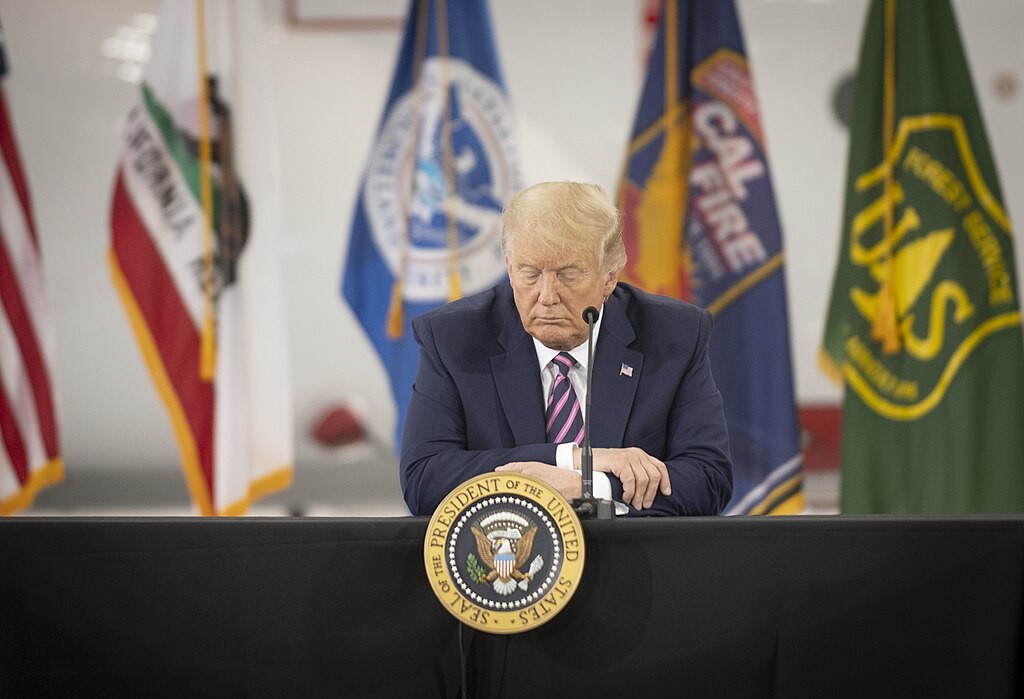Former President Donald Trump has declared his intent to dismantle the Department of Education if he returns to the White House in 2025. The proposal, which he argues would put decision-making power in the hands of state governments, reflects Trump’s longstanding critique of federal oversight in American schools.
Speaking at a campaign rally, Trump characterized the Department of Education as an unnecessary and bureaucratic entity that, in his view, has overreached its authority and failed American students. “It’s time to give power back to the states,” Trump said to a crowd of supporters, adding, “For too long, Washington bureaucrats have dictated how our children are educated. That ends now.”
Trump’s announcement has stirred controversy and reignited debate over the role of federal oversight in education. The Department of Education, established in 1979, has long been a target of conservative criticism. Opponents argue that its regulations restrict local autonomy, while supporters contend that federal oversight ensures educational standards and protects vulnerable students.
A Radical Shift in Education Policy
Trump’s proposal would represent a dramatic shift in U.S. education policy, transferring authority on key issues such as curriculum standards, funding allocation, and student assessments back to state governments. “Each state knows best how to educate its own students,” Trump asserted, framing his proposal as a move toward greater flexibility and responsiveness to local needs.
If implemented, the plan would eliminate federal funding programs and regulations, leaving states to determine how they wish to manage and fund their education systems. Advocates of the proposal argue that it would cut through layers of bureaucracy and allow states to innovate without interference from Washington.
However, critics warn that such a move could exacerbate educational inequality across the country. "This proposal threatens to widen the gaps in education quality, especially for students in underfunded schools," said a spokesperson for the National Education Association (NEA). "Federal oversight is crucial for maintaining standards and ensuring equal access to resources."
Reactions from Lawmakers and Educators
Reactions to Trump’s announcement were swift. Conservative lawmakers and education advocates praised the idea as a return to “local control,” a principle they argue is foundational to American governance. “Education should be a state matter, not a federal one,” said Rep. Jim Jordan (R-Ohio), a vocal supporter of Trump’s proposal. “This plan allows parents and local communities to take the reins.”
Meanwhile, Democratic leaders voiced strong opposition, warning that dismantling the Department of Education could harm students across the nation. “This proposal would strip resources from the students who need them most,” said Sen. Elizabeth Warren (D-Mass.). “Federal support is critical for students in low-income communities, students with disabilities, and English-language learners.”
Potential Impact on Federal Education Programs
Trump’s plan, if enacted, would affect numerous federal programs that support low-income students, special education, and school nutrition programs. Critics argue that removing federal involvement in education could lead to a patchwork of standards and further deepen educational disparities between states. Programs like Title I funding, which supports schools with high numbers of low-income students, could be eliminated or left entirely to state discretion.
Supporters, however, see the proposal as an opportunity for states to tailor educational practices without federal constraints. “Each state should have the freedom to decide what’s best for its schools,” said a spokesperson for the American Federation for Children, a conservative education reform group.
A Controversial Pledge with Wide-Ranging Implications
Trump’s plan to abolish the Department of Education reflects a sweeping vision of reducing federal influence in American life. Supporters view it as a long-overdue change that would empower states, while critics warn it could undermine educational equity. As Trump continues to lay out his vision for a potential second term, his stance on education is likely to remain one of the most hotly debated issues on the campaign trail.



 Trump Allegedly Sought Airport, Penn Station Renaming in Exchange for Hudson River Tunnel Funding
Trump Allegedly Sought Airport, Penn Station Renaming in Exchange for Hudson River Tunnel Funding  Netanyahu to Meet Trump in Washington as Iran Nuclear Talks Intensify
Netanyahu to Meet Trump in Washington as Iran Nuclear Talks Intensify  Missouri Judge Dismisses Lawsuit Challenging Starbucks’ Diversity and Inclusion Policies
Missouri Judge Dismisses Lawsuit Challenging Starbucks’ Diversity and Inclusion Policies  TrumpRx.gov Highlights GLP-1 Drug Discounts but Offers Limited Savings for Most Americans
TrumpRx.gov Highlights GLP-1 Drug Discounts but Offers Limited Savings for Most Americans  New York Legalizes Medical Aid in Dying for Terminally Ill Patients
New York Legalizes Medical Aid in Dying for Terminally Ill Patients  Pentagon Ends Military Education Programs With Harvard University
Pentagon Ends Military Education Programs With Harvard University  Nighttime Shelling Causes Serious Damage in Russia’s Belgorod Region Near Ukraine Border
Nighttime Shelling Causes Serious Damage in Russia’s Belgorod Region Near Ukraine Border  South Korea Assures U.S. on Trade Deal Commitments Amid Tariff Concerns
South Korea Assures U.S. on Trade Deal Commitments Amid Tariff Concerns  Trump Backs Nexstar–Tegna Merger Amid Shifting U.S. Media Landscape
Trump Backs Nexstar–Tegna Merger Amid Shifting U.S. Media Landscape  U.S.-India Trade Framework Signals Major Shift in Tariffs, Energy, and Supply Chains
U.S.-India Trade Framework Signals Major Shift in Tariffs, Energy, and Supply Chains  Trump’s Inflation Claims Clash With Voters’ Cost-of-Living Reality
Trump’s Inflation Claims Clash With Voters’ Cost-of-Living Reality  Trump Signs “America First Arms Transfer Strategy” to Prioritize U.S. Weapons Sales
Trump Signs “America First Arms Transfer Strategy” to Prioritize U.S. Weapons Sales  India–U.S. Interim Trade Pact Cuts Auto Tariffs but Leaves Tesla Out
India–U.S. Interim Trade Pact Cuts Auto Tariffs but Leaves Tesla Out  Trump Says “Very Good Talks” Underway on Russia-Ukraine War as Peace Efforts Continue
Trump Says “Very Good Talks” Underway on Russia-Ukraine War as Peace Efforts Continue  U.S. Lawmakers to Review Unredacted Jeffrey Epstein DOJ Files Starting Monday
U.S. Lawmakers to Review Unredacted Jeffrey Epstein DOJ Files Starting Monday  Japan Election 2026: Sanae Takaichi Poised for Landslide Win Despite Record Snowfall
Japan Election 2026: Sanae Takaichi Poised for Landslide Win Despite Record Snowfall 































